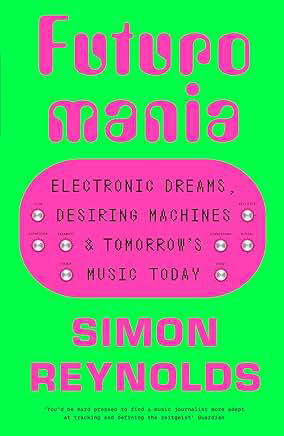Book Review: Futuro-mania - Electronic Dreams, Desiring Machines and Tomorrow's Music Today by Simon Reynolds
Collected journalism on electronica by one of our most important music writers.
Full disclosure: I have known Simon Reynolds for nearly 30 years. And like Matthew Collin he has been a mentor, friend, fellow enthusiast and massive inspiration to me over the years. Not for nothing did the TLS just call him the most important music writer of his generation, in fact I had suggested this angle to the Sunday Times back when Bring the Noise (his first collected journalism) came out in 2007-2008.
Anyone who knows Simon’s writing, knows what to expect from this book. Absolutely choc full of ideas about music and culture and the most sublime and evocative descriptions of that music possible. Although as he has aged, there’s less theory in the mix, personally I think this is a shame, but it may be to do with the fact he is writing more for the American market these days rather than publications like The Wire. Or perhaps he has mellowed? However the analysis he offers, his own philosophies are nonpareil.
Ideally this book should be savoured, one article at a time, one per day, because there’s a dizzying range of thought to take in. I read it faster than that but at times I felt like my brain would explode with all the ideas. Subject matter spans from Giorgio Moroder, Donna Summer and Kraftwerk, through classic Simon Reynolds obsessions such as rave, jungle, artcore, grime and dubstep - what he calls ‘the breakbeat continuum’ to up to the minute observations on Auto Tune and what he calls ‘Conceptronica’.
Possibly one of the most important essays in the collection is his analysis of Auto Tune - the pitch correction technology that first came to prominence in 1998 with the ‘robotic warble’ of Cher’s Believe and has come to define the last two and a half decades of mainstream pop, rap and R&B. Simon views Auto Tune as a future perfect development, however I have my doubts personally as it seems to have been used in an awful lot of homogenous digital music. all with that kind of late 90s trance (epitomised by Calvin Harris’s productions) backdrop.
Simon Reynolds is not just a wonderfully cerebral writer he’s also (unusually for a male rock critic) an emotionally intelligent thinker and not afraid to be vulnerable. There’s a lovely point near the end of his feature on Kraftwerk where he describes travelling, 12 years ago, in a car on an autobahn between the Black Forest and Cologne and listening to Kraftwerk’s Trance Europe Express, Neon Lights or Autobahn, (perhaps in the setting it was originally designed to be listened to) and actually breaking down in tears at the clarity and poignant beauty of it. It’s a rare male music critic that would admit to that.
What’s more there are intensely emotionally intelligent pieces included on Burial and Boards of Canada which make the most plaintive and evocative argument for listening to their music possible. The Burial essay also serves as a kind of elegy for his friend Mark Fisher, who championed this producer.
I was personally pleased to see that Simon had written a great piece for the New York Times in 2011 on ‘Synths and Sensibility’ the new wave of female electronic producers. I felt personally validated as I had suggested a piece on this topic to British Vogue around the same time 2009-2011 and it had been ignored as a pitch.
Like Matthew Collin’s Dream Machines - to which it would make a great companion book - this is a book of music criticism that makes you reach for your Spotify account or You Tube to actually investigate the music for yourself. I can give this no higher recommendation.




Another interesting piece, Bethan.